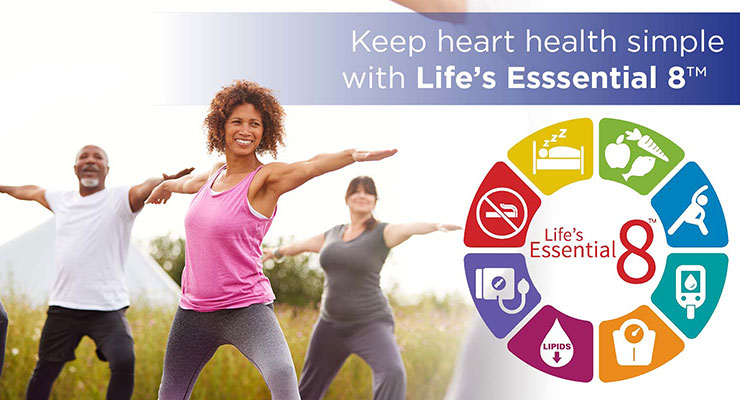Cardiologist John Schutz, MD, on Life’s Essential 8
- Category: General, Cardiology, Primary Care
- Posted On:
- Written By: Boulder Community Health

It’s important to know the state of your heart health now so you have a chance to improve it if necessary. That’s where the American Heart Association’s prescription for heart health, called Life’s Essential 8TM, comes into play. "It contains eight key measures for improving and maintaining heart health, which can help to lower your risk for heart attack, heart arrhythmias, heart valve problems, diabetes, stroke, dementia and other major health problems," said cardiologist John Schutz, MD, with Boulder Heart at Erie Medical Center and Community Medical Center in Lafayette.
"It contains eight key measures for improving and maintaining heart health, which can help to lower your risk for heart attack, heart arrhythmias, heart valve problems, diabetes, stroke, dementia and other major health problems," said cardiologist John Schutz, MD, with Boulder Heart at Erie Medical Center and Community Medical Center in Lafayette.
________________________________________________________
Watch Life's Essential 8: Your Checklist For Lifelong Heart Health
________________________________________________________
Life’s Essential 8 outlines a few easy steps you can take to build better health.
"Life's Essential 8 contains four modifiable measures, meaning lifestyle oriented, and the other four measures are biometric or physically measured," Dr. Schutz explained. He then described the eight components of Life's Essential 8:
- Eat better: Aim for an overall healthy eating pattern that includes whole foods, lots of fruits and vegetables, lean protein, nuts, seeds and cooking in non-tropical oils such as olive and canola. View or Download Fact Sheet: English (PDF) | Spanish (PDF)
- Be more active: Adults should participate in 150 minutes of moderate or 75 minutes of vigorous physical activity. Walking is great for moderate levels of activity. Kids should have 60 minutes every day, including play and structured activities. View or Download Fact Sheet: English (PDF) | Spanish (PDF)
- Quit tobacco: Use of inhaled nicotine delivery products, which includes traditional cigarettes, e-cigarettes and vaping, is the leading cause of preventable death in the U.S., including about a third of all deaths from heart disease. And about a third of U.S. children ages 3-11 are exposed to secondhand smoke or vaping. View or Download Fact Sheet: English (PDF) | Spanish (PDF)
- Get healthy sleep: Getting a good night’s sleep every night is vital to cardiovascular health. Adults should aim for an average of 7-9 hours, and babies and kids need more depending on their age. Too little or too much sleep is associated with heart disease, studies show. View or Download Fact Sheet: English (PDF) | Spanish (PDF)
- Manage weight: Achieving and maintaining a healthy weight has many benefits. Waist-to-height ratio (circumference of your waist divided by height) is a useful gauge. If you can keep this ratio to 0.5 or less (for both males and females), you can reduce your risk for stroke, heart disease and other major health problems.
- Control cholesterol: High levels of non-HDL, or “bad,” cholesterol can lead to heart disease. Your health care professional can consider non-HDL cholesterol as the preferred number to monitor, rather than total cholesterol, because it can be measured without fasting beforehand and is reliably calculated among all people. View or Download Fact Sheet: English(PDF) | Spanish (PDF)
- Manage blood sugar: Most of the food we eat is turned into glucose (or blood sugar) that our bodies use as energy. Over time, high levels of blood sugar can damage your heart, kidneys, eyes and nerves. As part of testing, monitoring hemoglobin A1c can better reflect long-term control in people with diabetes or prediabetes. View or Download Fact Sheet: English (PDF) | Spanish (PDF)
- Manage blood pressure: Keeping your blood pressure within acceptable ranges can keep you healthier longer. Levels less than 120/80 mm Hg are optimal. High blood pressure is defined as 130-139 mm Hg systolic pressure (the top number in a reading) or 80-89 mm Hg diastolic pressure (bottom number). View or Download Fact Sheet: English (PDF) | Spanish (PDF)
Take the free My Life Check to score your heart health
My Life Check® is an online tool to score the state of your own heart health against Life’s Essential 8. "This is a really nice assessment that lets you see which areas you need to work on to move toward ideal health," said Dr. Schutz.
Visit My Life Check now, or download the My Life Check App on Google Play and the App Store.
Dr. Schutz sees patients at Erie Medical Center and Community Medical Center in Lafayette. To make an appointment with him, call 303-442-2395
Click here to view/download lecture slides for his lecture on Life's Essential 8>